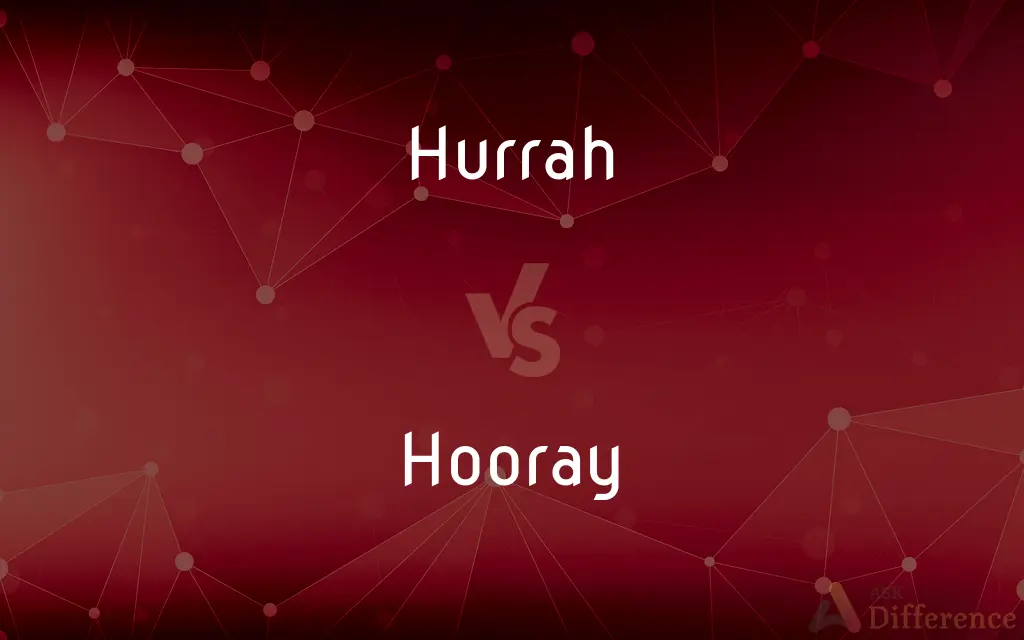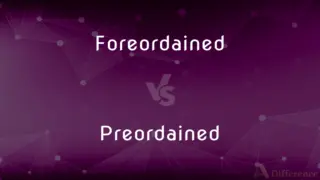Hurrah vs. Hooray — What's the Difference?
By Tayyaba Rehman & Fiza Rafique — Updated on April 16, 2024
"Hurrah" and "hooray" are both expressions of joy and enthusiasm, but "hurrah" is often considered more formal or traditional, while "hooray" feels more casual and commonly used in everyday speech.

Difference Between Hurrah and Hooray
Table of Contents
ADVERTISEMENT
Key Differences
"Hurrah" is an exclamation that has historical ties to military contexts and is used to express approval, joy, or encouragement. It carries a somewhat more formal tone and is less frequently used in modern casual English. "Hooray," on the other hand, is widely used in contemporary contexts and is favored in informal and celebratory situations, such as parties or casual gatherings.
Both "hurrah" and "hooray" are used to celebrate successes or express elation, but the usage of "hurrah" can often be seen in older literature or in more formal or traditional settings. In contrast, "hooray" appears frequently in informal dialogue and popular media, reflecting its broader adoption in spoken English.
The phonetic composition of "hurrah" can convey a sense of robustness and vigor, potentially making it suitable for emphatic expressions in speeches or formal declarations. Conversely, "hooray" tends to sound lighter and more spontaneous, making it a common choice in lively and casual expressions of happiness.
In written English, "hurrah" might be used to evoke a classic or vintage tone, suitable for historical narratives or formal writings. "Hooray," whereas, is often seen in informal texts, children's books, and dialogues that aim to convey a contemporary and relaxed tone.
Regarding global usage, both expressions are understood in various English-speaking regions, but "hooray" might be more immediately recognizable across different age groups and demographics, particularly among younger speakers and in American English.
ADVERTISEMENT
Comparison Chart
Tone
More formal, traditional
Casual, contemporary
Usage Context
Military, formal speeches
Casual celebrations, everyday speech
Frequency in Speech
Less common, more historical
More common, especially in the US
Sound
Robust, vigorous
Light, spontaneous
Typical Users
Older generations, formal settings
Broad, especially younger generations
Compare with Definitions
Hurrah
Conveys a robust and encouraging tone.
Hurrah for our team, the coach exclaimed after the victory.
Hooray
Common in informal and lively settings.
Hooray for pizza nights! the children cheered.
Hurrah
An exclamation of joy or approval.
Hurrah! We won the championship!
Hooray
Often found in casual dialogue and media.
The cartoon characters sang, Hooray, hooray, it's a sunny day!
Hurrah
Associated with historical and military celebrations.
The veterans cheered Hurrah! at the parade.
Hooray
Sounds spontaneous and light.
Hooray! We did it! she cried out after they finished the project.
Hurrah
Often used in formal or traditional contexts.
The crowd shouted Hurrah! as the soldiers marched by.
Hooray
Used broadly across different age groups, especially in casual speech.
Everyone shouted Hooray! at the surprise announcement.
Hurrah
Used to express vigorous support or enthusiasm.
Hurrah! That’s the spirit! the captain encouraged her team.
Hooray
An exclamation used to express joy, approval, or encouragement.
Hooray! School’s out for summer!
Hurrah
Variants of hooray.
Hooray
From the old Norse battle cry "Huer Av", meaning "Heads Off".
Hurrah
Expressing approval, appreciation, or happiness.
Hooray
Used as an exclamation of pleasure, approval, elation, or victory.
Hurrah
A cheer; a cry of hurrah!.
Hooray
A shout of "hooray."
Hurrah
To give a hurrah (to somebody).
Hooray
Excitement; fanfare.
Hurrah
A word used as a shout of joy, triumph, applause, encouragement, or welcome.
Hurrah! hurrah! for Ivry and Henry of Navarre.
Hooray
To applaud, cheer, or approve (someone or something) by shouting "hooray."
Hurrah
A cheer; a shout of joy, etc.
A perfect hurrah's nest in our kitchen.
Hooray
To shout "hooray."
Hurrah
To utter hurrahs; to huzza.
Hooray
Used to express approval, joy or victory.
Lizzie has broken a world record, and she is now an Olympic medallist! – Hooray!
Hurrah
To salute, or applaud, with hurrahs.
Hooray
A shout to signify victory.
Hurrah
A victory cheer;
Let's give the team a big hurrah
Hooray
An expression of excitement.
Hurrah
Shout `hurrah!'
Hooray
To shout an expression of excitement.
Hooray
A victory cheer;
Let's give the team a big hurrah
Common Curiosities
What is the main difference in usage between "hurrah" and "hooray"?
"Hurrah" is typically used in more formal or traditional contexts, while "hooray" is common in casual and contemporary settings.
Can "hurrah" and "hooray" be used interchangeably?
Yes, both can express joy or celebration, but the choice may depend on the formality of the setting.
Why might someone choose "hurrah" over "hooray"?
Choosing "hurrah" could be to evoke a more traditional or robust tone, particularly in formal writings or speeches.
What makes "hooray" suitable for casual use?
Its light and spontaneous sound makes it suitable for informal and lively occasions.
Are there any regional preferences for using "hooray"?
"Hooray" tends to be more universally recognized and used, particularly in American English and among younger speakers.
What settings are most appropriate for using "hurrah"?
Military events, formal celebrations, and historical narratives are apt settings for using "hurrah."
Does the choice between "hurrah" and "hooray" affect the message conveyed?
Yes, "hurrah" might lend a message a formal or solemn undertone, whereas "hooray" adds a light-hearted or enthusiastic note.
How does the tone differ between "hurrah" and "hooray"?
"Hurrah" sounds more robust and traditional, whereas "hooray" feels lighter and more spontaneous.
How do different age groups perceive "hurrah" and "hooray"?
Older generations might be more familiar with or prefer "hurrah," while "hooray" is widely accepted across all ages, especially in informal contexts.
Is "hurrah" seen in modern literature?
It appears, often to lend a classic or historical flavor to the text.
Is "hurrah" outdated?
While less common in everyday speech, "hurrah" is still used, especially in formal or historical contexts.
How has the popularity of "hurrah" and "hooray" changed over time?
"Hooray" has become more prevalent, particularly in casual and modern contexts, while "hurrah" retains a niche usage.
Which exclamation would be more appropriate at a sports event?
"Hooray" is typically more fitting for the energetic and informal atmosphere of sports events.
Can the use of "hurrah" in speech indicate anything about the speaker?
It might suggest a preference for traditional language or a context that calls for a formal tone.
What impact does using "hooray" have in communication?
It generally adds a cheerful and approachable tone to interactions.
Share Your Discovery

Previous Comparison
Bro vs. Homie
Next Comparison
Foreordained vs. PreordainedAuthor Spotlight
Written by
Tayyaba RehmanTayyaba Rehman is a distinguished writer, currently serving as a primary contributor to askdifference.com. As a researcher in semantics and etymology, Tayyaba's passion for the complexity of languages and their distinctions has found a perfect home on the platform. Tayyaba delves into the intricacies of language, distinguishing between commonly confused words and phrases, thereby providing clarity for readers worldwide.
Co-written by
Fiza RafiqueFiza Rafique is a skilled content writer at AskDifference.com, where she meticulously refines and enhances written pieces. Drawing from her vast editorial expertise, Fiza ensures clarity, accuracy, and precision in every article. Passionate about language, she continually seeks to elevate the quality of content for readers worldwide.














































